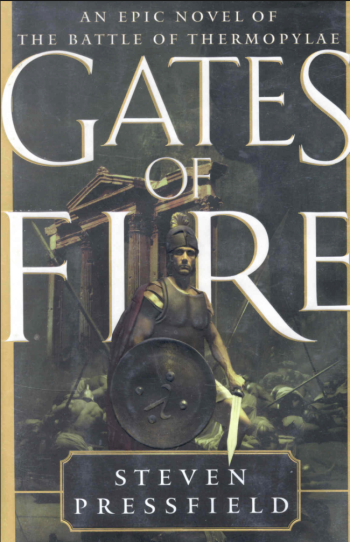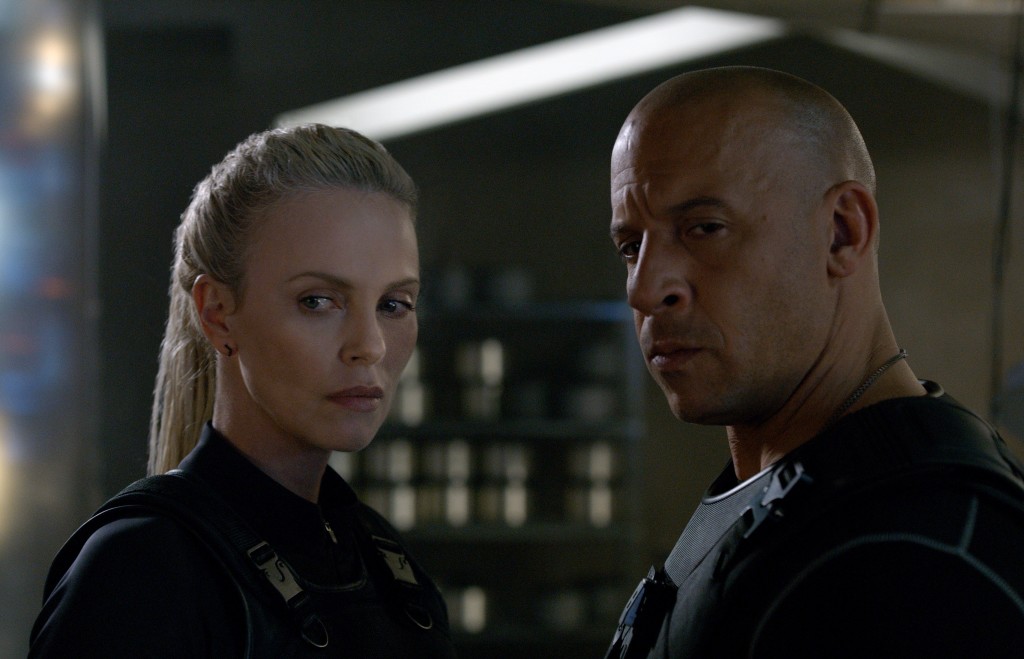Genre: Period
Premise: A young man is made a slave by the Spartans just as they begin preparing for a war against the mighty Persian army.
About: George Clooney fucking loved this book (going so far as to say it’s better than Gladiator!), immediately snatching it up after publication for his production company. He would later hire David Self to write the script (Road to Perdition) and field monthly calls from Bruce Willis, who was dying to be in the film. Things got so hot, Michael Mann (Heat, Last of the Mohicans) attached himself as director, and everything was looking like a go. But ultimately, the drafts weren’t good enough to get the film into production. I hear that the book tackles some controversial topics, such as the Spartans bisexuality during training. But none of that is present in the script, which is too bad. This script needed something worth talking about. Some controversy might’ve spiced things up.
Writer: David Self (based on the novel by Steven Pressfield)
Details: 137 pages (2011 draft)
I’m not sure what the endgame was with this one.
Five years prior, 300 had come out, covering the same territory. If I were to guess, Mann wanted to make a realistic (as opposed to ‘comic book’) version of that famous “300” battle.
Unfortunately, Mann’s choices have become questionable over the last decade. This is a man who used to be one of the top 5 directors in Hollywood. He was the David Fincher of his time – cool and hip, the style every director emulated. Christopher Nolan and Ben Affleck routinely credit him as a major inspiration.
If you’ve never seen Last of the Mohicans, make a night of it. It’s amazing (especially those last 20 minutes!). The way Mann brings together imagery and sound and score and acting and direction – it’s top-notch. So it’s hard to target where he went wrong in his career. Although I suppose his last five films leave some clues.
Ali – This one was hard to judge because all anyone talked about was Will Smith’s turn as a serious actor. I remember it looking beautiful (like all of Mann’s films) but don’t remember much else.
Miami Vice – This never knew what it wanted to be. It had one foot in the show and the other in something that had nothing to do with the show, leaving most audiences confused.
Collateral – This was probably the best of his last five movies, and a big reason for that was the tight premise. It goes to show what happens when you stay focused (an issue we’ll talk about with today’s script). Still, there wasn’t anything here to latch onto. Mann had made a fun but forgettable film, something he’d never done before.
Public Enemies – A lot of the same problems as Miami Vice in that it wanted to cover a lot of ground and yet, in doing so, covered very little.
Blackhat – I remember reading this script and thinking, “What is this even about?” So I wasn’t surprised when the trailer came out and everybody asked, “What was that even about?” And less surprised when no one saw it.
I think Mann’s script problems boil down to being more interested in moments than the big picture. He loves when a character drives down a street, sees a wolf, stops, and he and the wolf exchange stares – symbolism and subtext fucking each other harder than first date sex. Pulling those intense moments together into a cohesive whole, however, is his achilles heel. Speaking of Achilles, let’s head back to Roman times for our plot breakdown, shall we?
It’s 480 B.C. at the Phokian Border in Greece, also know as “The Gates of Fire.” It’s here where we meet Zeones, who’s been rendered immobile after a bloody battle. He’s snatched up by a passing Egyptian army, who, had they come a day later, would’ve found Zeo dead.
They ask Zeo to tell them how he ended up here and he goes into his story, a la Old Rose in Titanic. When Zeo was a young man, the Argives came to his home and killed his family. Zeo survived, and would later stumble upon the Spartan army, who at the time were in an ongoing war with the Argives. They kindly take Zeo in as a slave.
From there, he learns the strict ways of the Spartan code. Strangely, Zeo doesn’t participate in any of these activities. He spends most of his time on the bench, watching the big boys dunk and alley-oop.
Meanwhile, there is a growing sense that the Persians, who at the time ruled half the known world, were going to invade Greece and turn the Spartans into Spartan mashed potatoes. This sucks because the Spartans haven’t even conquered their own country yet (the Argives), which means they have to battle them before they can mount a defense against the Persians.
This whole time, Zeo watches on with a mixture of curiosity and fear (mostly fear). Oddly, almost every other character has a more interesting story than our hero. Some want to be traitors and join the Persians. Others have fathered babies with friends’ wives. Some chose to die by Spartan ritual rather than admit weakness. The most Zeo does is listen real good.
Everything culminates when the Spartan Army crosses the mountains to head the Persian army off, and finds that famous wedge in the rocks where they can mount their historic defense.
It’s never a good sign when you’re 50 pages into a script and you don’t know what it’s about. It’s actually not uncommon for professionals to make this mistake as some of them will assume that whoever reads the script will be told the premise ahead of time (in this case, that it’s about the famous Roman-Persian battle) and let that pitch act as the reason to keep reading.
But I’ll always contest that a script must work on its own. You can’t assume forces outside the pages will do the work for you. And that’s one of many problems with Gates of Fire. There is no clear story evolving. And there is no clear structure present either.
I never got a sense of when the first act ended or when we hit the midpoint. Inciting incidents and lowest points must have been grounded at the time this was written. And while it’s fair to say, “Not every script should adhere to the Hollywood 3-act structure,” you need SOME structure to focus your story. This had none.
A big reason for that was the main character, Zeo. Not only did he have zero goal (this from a guy whose family was slaughtered – could a clearer potential goal have been presented??) but no clear motivation either. It’s a bad sign when your main character is the weakest character in the story. Zeo was not active. He was quiet. He was weak. He had no personality. He never made a choice (all the other characters made choices for him). The only reason he seemed to be in the story was to see all the other characters do interesting stuff.
There’s a very simple test to know if your main character is compelling or not: Imagine pitching the part to an actor. If you have to say things like, “He’s timid.” “He rarely speaks.” “He’s weak.” “He has no personality – he doesn’t get mad, sad, angry. He isn’t funny. He’s bland.” “He watches others do things while doing nothing himself.” I mean, in the first giant script battle, Zeo spends the entire scene watching from the sidelines. Do you see any actor wanting to play that part? Of course not. Which means it’s time to rewrite the character.
In that sense, the solution to this screenplay was clear. It needed to focus on someone else. Anyone other than Zeo. I get that the main character’s job, most of the time, is to act as a stabilizing force. He needs to be grounded. But if you dig him into the ground too deeply, we won’t be able to see him anymore.
This speaks to a bigger issue, which is that sometimes, when you want to write something epic, you forget to zoom in. You think, “This has to be BIG!” And so all you focus on is the bigness. But if you don’t connect us to a few characters on the micro level, then nothing that happens on the macro will matter.
That’s what James Cameron did with Titanic. He knew if he only jumped back and forth between a bunch of people on the ship, we’d never care about the tragedy. You might as well read the summary on Wikipedia. So he made us fall in love with two of the characters, ensuring that we felt what the people on that ship felt.
I’d go so far as to argue the bigger the stage, the more you need to zoom in. So if you’re telling a story about World War 2, find a very specific story within that subject matter. Once you’ve done that, make us fall in love with and care for two (or three, or four) specific characters in that predicament.
We never got that here, which is unfortunate. Gates of Fire did have some interesting moments. Just nothing to hold them together.
[ ] What the hell did I just read?
[x] wasn’t for me
[ ] worth the read
[ ] impressive
[ ] genius
What I learned: I hate when heroes are on the sidelines for major moments in a script. I hate it. This is your hero! If there’s a major battle going on or a huge set-piece and your hero isn’t in the scene? You should probably rewrite that scene to include them. And if your response is, “Well, the way he’s written, he wouldn’t be in that scene.” That would be the argument here, I’d assume. Zeo is a slave so he wouldn’t be able to participate in a battle. If that’s the place you find yourself in, you’ve probably picked the wrong character to lead your story.
EDIT: STRIKE AVERTED! YAYYYYYYY!
When you look at the impending writer’s strike, this is what you see. An industry making 51 billion dollars while many writers are struggling to pay their monthly rent. At first glance, that doesn’t seem fair. But I also know numbers can be deceiving. 51 billion isn’t the profit margin. It’s the revenue. Let’s not forget how much money goes into prep and production and expenses and advertising. And let’s not forget all the TV shows and movies that fail, costing studios billions of dollars (hits pay for misses). 51 billion dollars is a big number. But it doesn’t tell the whole story.
Also, the writers have to see the studios’ side. If the studios paid everybody – actors, directors, above-the-line, below-the-line – what they wanted, there wouldn’t be any studios left. They’d all be bankrupt. There has to be some acknowledgement that these people are running a business and nobody’s in business to break even.
We also need to take into account perspective. We tend to see problems the way they relate to us and us only. Writers, obviously, feel like they’re vastly underpaid. But it’s not like we’re perfect. Tell me how you’d feel if you just paid an A-list writer a million dollars and they turned in a shitty draft, forcing you to hire another A-list writer with another million dollar quote. I’m assuming you’d feel like you just got screwed. And that happens all the time.
Look no further than Michael Jordan for a lesson on perspective. As a player, he routinely complained about how cheap his owner, Jerry Reinsdorf, was. Jordan’s team was winning Reinsdorf championships yet Reinsdorf was notoriously stingy during negotiations. It infuriated Jordan. Now that Jordan himself owns a team, he’s known as one of the thriftiest owners in the league, eschewing big contracts for his players and, yes, being notoriously stingy during negotiations. The ceiling is the roof.
Perspective is important because unless you understand the other person’s side, you’re convinced you’re getting screwed, and that’s what turns negotiations personal, which is how these things spiral out of control and everyone loses money, or worse. I’ll never forget when a writer told me during the last strike that his friend, who was also a writer and had a mortgage, a wife, and three kids, was thinking of committing suicide. After that moment, I started seeing the strike from a completely different perspective.
With all this said, there’s no question that writers are underpaid. In fact, they’re vastly underpaid. And it’s something I’ve never understood. Without writers, THERE WOULD BE NO ENTERTAINMENT!!!!!! There would be no Star Wars. There would be no Breaking Bad or Sopranos. There would be no Guardians of the Galaxy 2 this weekend. There wouldn’t even be reality TV shows. How is it that the people who give life to every film and TV show are so undervalued? Not to mention, hundreds of people become employed every time a writer writes a good script.
The answer to this question may be that writing is the least visual of all the processes in the medium.
You can watch an actor create a great performance right in front of your eyes. You can see a director organize and block a scene. You can see the cinematographer frame a shot, the gaffer put the lights in place, and the audio guy mic up the talent. But nobody sees a writer write. And if you can’t see something, is it real? If a tree falls in a forest…?
It’s why, whether you like their writing or not, people like Max Landis, Damon Lindelof, Diablo Cody, and (going old school here) Joe Eszterhas, are important to the writing industry, because it reminds the industry that we’re here. Writers are real. I would love for more screenwriters to market themselves in this digital “look at me” age. It’s not a ridiculous proposition. Legendary writers like Truman Capote and Ernest Hemingway were masters at marketing themselves. As is Stephen King today. We need to be visible because out of sight = out of mind.
It doesn’t help that everybody thinks they can do the writer’s job better than the writer. You hear a bad line in a movie and you say, “I can do better than that.” And based on that one bad line, or one bad scene, you’re convinced that you’d do a better job screenwriting than the professionals. That ignorance isn’t limited to the average audience member. The majority of people in production feel the same way.
None of these people realize just how much goes into writing. That it isn’t a line that defines a story, but the 385 choices made that lead up to that line. Look at a show like Breaking Bad. What the average person doesn’t know is that Vince Gilligan’s choice to build the entire story around a dramatically ironic premise (Walter White keeping his meth business a secret) ensured that three seasons down the line, when they had to shoot a quiet family dinner scene, that scene would still have tension and suspense, since Walter is lying to his family every moment he’s with them.
Someone who doesn’t understand screenwriting would NEVER think of that. But this is what screenwriters do. This is what we bring to the table. Knowledge of story, structure, characters, conflict, suspense, theme, dialogue and a million other things! We may not always hit it out of the park, but I guarantee you we’ll do it more than Joe Moviegoer.
We are in an age where screenwriting is more important than ever. On the feature side, instant social media reaction has eliminated the scam of fleecing audiences on opening weekend and riding that box office buzz to a respectable take. The social media rejection of films like Fantastic Four, The Great Wall, Pan, Now You See Me 2, The BFG, Ghost in the Shell, Ben-Hur, and many others, prove that.
On the TV end, what was once being heralded as the golden age of television has now become one of the most competitive arenas in business. There is so much content that the only way to stand out is excellent writing. It’s why shows like Mr. Robot, Fargo, Big Little Lies, 13 Reasons Why, Westworld, Atlanta, The Americans, to name a few, have found success. Great writing. If the people writing these shows can barely pay their monthly expenses, it’s only so long before they move on to something that does pay.
What the writers are asking for isn’t much. They’re asking for more than 1 step deals on the feature side, not to be held hostage all year for a short TV series, and, finally, a better health care package. Nobody’s asking for 5% of the gross of Fast and the Furious 9. I feel like this is totally doable. And I hope it gets done by the end of the day. Because strikes are unpredictable. For us to be a couple of months down the line with no deal in sight would be a tragedy.
Let’s get this thing done today!
Hey everyone. So, I’ve been a naughty boy. I actually didn’t have any project to finish. Instead, I went on vacation! I needed it, man, if only to rejuvenate my soul. I decided to go to a city that people have been telling me to visit for years now – Prague! And, boy, did it live up to the hype.
Unlike cities here in the U.S., Prague has grown organically over hundreds of years, leading to beautiful architecture, cobblestone streets, and a series of twisting tunnels and walkways that make the city feel like one giant kid’s fort.
Here are a few pictures. The thing on the bottom is called a langos. It’s fried dough with cheese sprinkled on top, along with tomato sauce. Although the tomato sauce on mine tasted suspiciously like ketchup. Either way, it was fried dough. So it was wonderful.
I’ll be back Monday for regular posting. We’re going to start off talking about the writer’s strike. In the meantime, I highly recommend Prague as your next vacation spot. It’s a glorious city!
Hello all. A quick heads up. I’m in the midst of a project I have to finish which is going to affect my posting for the next week and a half. Expect sporadic posting during that period. I know a lot of you are wondering when the Shorts Contest announcements are going to rev up. And I promise you that after I’m finished with this, the Shorts are my main priority. The director is on me every day to get this going so we’ll get’er done. Don’t worry.
In the meantime, let’s all check out the latest Star Wars trailer. And… I don’t know guys. Something’s not doing it for me here. The first half of the trailer looks like three people got a cool location, shot there for a day, then cobbled together a Star Wars fan film. There isn’t a single iconic shot in here. And the story looks like it can be boiled down to, “Luke’s Mad.” That sucks. I was hoping for a lot more. What’d you guys think?
Today we’re going to talk about summer madness and all the shapes, colors, and sizes it comes in. With Fast and the Furious dropping their bi-annual supercharged nonsensical treatise of loyalty and family on an all-too-eager public this weekend, how could you NOT get excited about the summer box office? I know I am. For both the good and the bad. Here are the key projects I’ll be keeping an eye on…
Dunkirk
It’s hard to have much of an opinion on a Christopher Nolan movie before it’s released since he’s so darn secretive. But even the most hardened Nolan films will agree that this is a pivotal movie for Nolan. His last two movies (The Dark Knight Rises and Interstellar) were major messes, with progressively sloppier screenplays. Exploring another genre was a good idea. But now we’re getting details on the plot, which involves soldiers… running away? Hmmm… that doesn’t sound very active or heroic to me. I’ll see any Christopher Nolan movie. They’re events. But if this doesn’t work, the Nolan shrine may need to be placed in storage.
Thor: Ragnarok
Wow. Where the hell did this movie come from?! As if Marvel didn’t have enough success. They take their worst character, pair him with the Hulk, put him back where he came from (another planet) and all of a sudden this looks like the freshest coolest comic book movie out there. There’s a screenwriting lesson to be learned here. You need to play with ideas more when you come up with a concept. If you go the obvious route, you come up with Thor 1 & 2. They found the right combination of ideas with this one and, out of nowhere, it’s awesome. This is now one of my most anticipated movies!
King Arthur
This movie was supposedly shot, then reshot, then one half of that reshoot was reshot and then someone shot themselves for shooting it in the first place. You can tell when a studio movie had extensive reshoots cause that money then comes out of the special effects budget. I suspect the effects to King Arthur were outsourced to a guy in Korea with an Atari 2600. You know a movie is bad when you don’t even know what it’s about after the trailer. What is this about? I suppose they should get credit for giving us a fresh take on King Arthur. But it just goes to show that fresh takes are still gambles. You have one that worked out (Thor) and one that didn’t (King Arthur). It’s time to put that sword back in the rock.
It
If you’re anything like me, you’re skeptical about this new Hollywood benchmark that’s taken over the internet: Most trailer views in 24 hours. It seems to be the only thing that anybody cares about anymore. However, everyone knows that the studios pay for at least a portion of these views. So how seriously can we take them? “It” is the new record holder, with something like 250 million views. Regardless of my trailer view skepticism, the movie looks great, and their adaptation approach was very clever. This book can’t fit into a single movie. However, a trilogy would’ve been too much. To split it into the kids film and the adults film was a stroke of genius. And we all know how much I loved Andres Muscietti’s previous effort, Mama. So count me in!
Guardians 2
There is no franchise more tuned into what the public is looking for than this one. Guardians 2 has just the right blend of character, humor, action and Groot. And you can already tell that this film is more confident than its predecessor, a movie where director James Gunn admitted that he thought he might be making the next Pluto Nash. Guardians will probably win the summer box office prize, a prize it will, unfortunately, have to hand over to Star Wars at the end of the year.
Spiderman: Homecoming
I’m neutral on this one. It seems to me like they’re making a smart play though. You know that old saying, “When you try to please everybody, you please nobody?” That’s clearly what was going on in the last two Spiderman movies. They wanted so badly for everybody to like them that you could feel it permeating off the screen. With this new version, they’ve kinda said, “Let’s move away from that” and gone back to Spiderman’s roots, which are in high school. So they’re targeting a more specific demographic, the teenage crowd, and we’ll see how it works. I know I liked Cop Car (the director of that tiny film landed this job). And if there’s a lesson to be learned for screenwriters, that may be it. Make a small passion project and direct it yourself. Who the hell knows what might come of it?
The Fate of the Furious
I don’t care what you say about Fast and the Furious. It still has the best and most inventive set pieces in the action game. It beats out Mission Impossible, Bourne, and James Bond in that category. In fact, one of the most common notes I give on action specs is to be more inventive with your set pieces. Fast and the Furious had two cars dragging an apartment sized vault through the city streets. You need to do better with your set pieces if you want to compete. Now regarding this plot point of Dominic turning on his team. How probable is it that it’s part of a bigger plan to help his team? One thousand percent? One million?
Valerian
For super movie nerds, this is a project all of us have been following for awhile. Why? One answer: The Fifth Element. This was going to be what Luc Besson would’ve done with The Fifth Element had he had more money. Besson is a great filmmaker. And he was supposedly creating sequences and techniques that had never been used before to give the audience a one-of-a-kind experience with Valerian. But after seeing the trailer, I was shockingly disappointed. This was it?? Sure, it seemed okay. But it hardly felt like something I’ve never seen before. Then it struck me. It wasn’t the visuals I was having a negative reaction to. It was the characters. How fucking boring do these two characters look? They mumble. They have no chemistry. There doesn’t seem to be any conflict between them (in fact, it’s the opposite, they seem to like each other – major screenwriting mistake!). Watch the Guardians and Thor trailers then watch this. Note how much more personality the characters have in those trailers. Valerian is in trouble. And let this be a lesson to screenwriters everywhere. Don’t get lost in your world-building. Make sure the characters are compelling first. Or nothing else matters.
Alien: Covenant
Why do I get the feeling that Scott’s only making these movies out of spite? And when Scott goes spite, he goes FULL SPITE! After this film, he has three more Alien movies lined up. Say what?? Not to jump on Thor’s jock yet again. But the idea with any franchise is to elevate, find fresh new ways to explore the subject matter. This looks like the same exact movie as the last one. I don’t get it.
Rest of the movies: I’m not a fan of the DC films so I’m not looking forward to Justice League or Wonder Woman. It seems that their big mistake is hiring visual directors, whereas the Marvel guys are hiring storytellers. As for “maybe” movies – Pirates, The Mummy, and Apes – the reinvigorated Pirates looks like it’ll be the breakout (can Disney do no wrong?). But The Mummy doesn’t look bad either. Don’t get me started on Transformers (they could slip one of the previous four films in theaters, slap a “5” on it, and I swear nobody would notice. Save 200 million bucks). One day somebody’s going to do a documentary on how the five worst movies ever made became five of the biggest box offices successes of all time. Of the two Stephen King offerings, The Dark Tower was never my cup of tea. “It” was so inspired. Tower just dragged on. I never made it to the end (8 books!), but I hear the ending was terrible. All that investment for no payoff. I have a feeling this franchise isn’t going work. Still, one for two ain’t bad.
And that’s my roundup! What about you folks? What are you looking forward to? What movies do you think are undervalued? Overvalued? Chime in in the comments!










